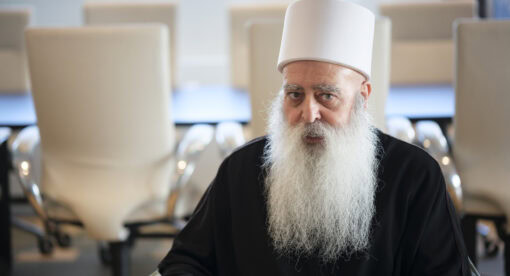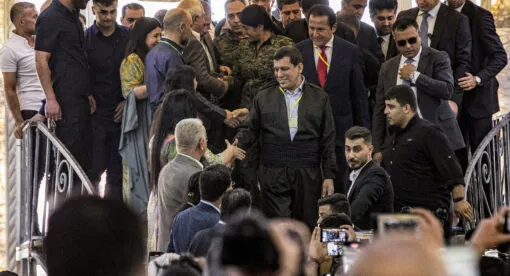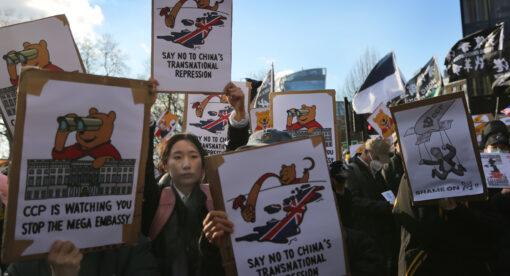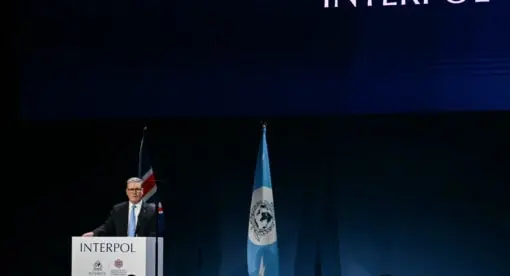Ever since U.S. forces killed the self-styled caliph of the so-called Islamic State Abu Bakr al-Baghdadi, the policy community has been debating the future of ISIS. The organization’s potential to recruit more Muslims and its capacity to generate more terrorism are factors that could, to an extent, determine the direction of the global struggle against violent extremism and the U.S. military presence in Syria and Iraq.
At this critical moment in the policy debate, an American Muslim research group, the Yaqeen Institute, decided to publish an article by Professor Ovamir Anjum of the University of Toledo that calls for the establishment of a caliphate. This uncritical glorification of the idea of the caliphate – a transnational political construct theoretically meant to unite all Muslims – has no place in a serious discussion of global security. The current ideal of the caliphate is not based in historical reality – much less normative Islam. In fact, the call for the return of the caliphate lends legitimacy to the Salafist jihadist ideology. It also gives credence to the claims of Islamophobes that American Muslims are practicing taqiyya (acts of deception or denial about Islam in order to gain Westerners’ trust). Moreover, it could prime young Muslims for recruitment and thus enable the resurgence of ISIS.
Flirting with Danger
The promotion of the idea of a caliphate when the whole world (including many, if not most, Muslim nations) is fighting ISIS, is unwise and unfortunate. When young Muslims upset at Islamophobic rhetoric in the United States and the despair and suffering of Muslims in conflict zones such as Kashmir, Syria, China, and Gaza read this article and are persuaded that only a caliphate can help Muslims, where will they go? The only group that currently claims to be a caliphate is ISIS.
Moreover, in this age of Islamophobia, American Muslims who talk of Islam as peaceful, tolerant, and democratic are being accused of practicing taqiyya and of being “crypto-radical Muslims” who fake a pro-democracy and pro-American stance while secretly nurturing an anti-Western agenda. Arguing for the return of the caliphate only reinforces this viewpoint. Already, a longstanding critic of the American Muslim community, Zuhdi Jasser, has pounced upon Anjum’s article to make exactly that point. The promotion of the idea of the caliphate mirrors the radical Islamists’ call for the return of the caliphate, which Salafists and jihadists consider the only true Islamic political order.
The Yaqeen Institute is the brainchild of Sheikh Omar Suleiman a prominent imam in American Islam who is committed to rebutting accusations of taqiyya. He is very popular with American Muslim youth, who look to him for guidance in both the spiritual and political spheres. Even though he is not the author of this article, the Yaqeen brand gives the tract a reach and legitimacy far beyond its intrinsic value.
Three False Premises
Professor Anjum’s thesis that we must seriously consider the idea of the caliphate is premised on his assumption that Muslims who are suffering political strife and oppression are on the streets demanding a caliphate. To quote him, “the calls grow shriller” for a global ummah and a caliphate. This premise is based not on any substantive study or survey whatsoever but on an opinion article in a Western newspaper that cites two tweets and a couple of anecdotes as evidence of the desire for a caliphate. During travels through Turkey, Egypt, Tunisia, Jordan, and Morocco during the height of the Arab Spring, I never witnessed a single protest where people demanded a caliphate. They were calling for freedom and dignity.
Surveys of the Muslim world conducted by PEW Research indicate that while Muslims do want some undefined role for Islam in the public sphere, vast majorities want democracy. Gallup surveys conducted by no less than Ms. Dalia Mogahed, currently a board member of Yaqeen Institute, found that not only did Muslims overwhelmingly want democracy, they also saw Islam and democracy as compatible and did not want a theocracy. Muslims who are among those suffering the most today – the Uighurs, Rohingya, Palestinians, Syrians, Kashmiris, Kurds, and Moros – are not clamoring for a caliphate. On the contrary, most of them are demanding or fighting for their own nation-state. (Do click all the links on the groups listed above; they will lead you to information about these populations’ movements and aspirations for nation-states of their own.)
Anjum makes a second false premise: that the nation-state is unraveling. This premise is based on books written in the 1980s and 1990s, when globalization was at its peak and nation-states were willingly surrendering their sovereignty to supranational entities and the emerging neoliberal global order. I, too, wrote in the New York Times in 2015 that modernity had failed us all, especially Muslims. But there is a course correction taking place. We are witnessing the beginning of “de-globalization” – the unravelling of supranational institutions, the reassertion of state sovereignty and state borders, and the emergence of hyper ethno-nationalism. Some nation-states may be failing in the Arab world, but they are fighting back everywhere else.
The author shows very little nuance while examining the political reality of the Muslim world. When we look at the Arab world, we see chaos and disaster and profound dissatisfaction with existing governance. But things are not that bad when you look at Malaysia, Indonesia, Turkey, Morocco, Bosnia, and Bangladesh. In most of these places both democracy and the economy, though not without problems, are doing well. None of these states appears to be on the verge of collapse. Only those states where political Islam and Islamic extremism are more prominent, like Sudan, Egypt, Syria, Iraq, Lebanon, and Yemen, are failing. The monarchies are stable as states though some of their foreign policies may be destabilizing the region. Pakistan and Iran are deeply troubled but certainly far from collapse.
His third premise that a caliphate automatically implies unity and peace is divorced from any realistic reading of history. Imagine if we had a video of protesters laying siege to the city of Madinah and the residence of the third Caliph and then eventually assassinating him. Or a video of the companions of the Prophet and their followers fighting civil war after civil war (Jamal, Siffin and Nahrawan) during the reign of the fourth caliph alone. Or a video of the family of the Prophet going to war with itself, wife against son-in-law. It would certainly disprove the false narrative of the alleged peace and unity that the Salaf al-Saliheen (pious predecessors; a reference to the first three generations of Muslims) enjoyed under the best of caliphs (al-Rashidun). Let us be true to the Islamic tradition. If the best of Muslims could barely sustain the caliphate for 30 years (632-661 AD), what hope do Muslims today have of establishing and sustaining a caliphate?
The Caliphate and Political Integration
Anjum offers two conceptions of the caliphate: one minimalist, which he describes as part of the Muslim faith, and one of a loose confederated political union as his personal vision of a feasible future caliphate. The minimalist definition includes two things: “political unity of Muslims and the continuity of Prophetic governance.” He claims that these two items have been part of Muslim identity throughout history. He never uses the term “Prophetic governance” ever again in his more than 18,000-word treatise. He appears indifferent to the content of the caliphate and its constituent entities as long as he can muster a politically united Ummah. Unfortunately, he does not critically examine the feasibility of establishing such a unity.
Muslims have been divided since the death of Prophet Muhammad and have been fighting each other since the first caliphate and the Riddah wars. Ironically there was a time – 929-1031 AD – when three caliphates existed simultaneously: the Abbasids in Baghdad (749-1258 AD), the Fatimids in Cairo (909-1171 AD), and the Umayyads in Cordoba (929-1031 AD). So much for assuming that having a caliphate in some way equates to political unity of the Ummah. Anjum also does not take into account the recent failures at political unification by Muslims: The United Arab Republic lasted only three years, Pakistan split in two within 24 years, and Gaza and West Bank cannot present a united front. Other efforts at cooperation have resulted in the toothless Organization of Islamic Cooperation and the Arab League, and members of the Gulf Cooperation Council (the most homogenous group of Muslim nations) are busy blockading one of their own. Saudi Arabia has attempted to establish a Sunni alliance and an Islamic NATO with no success. History and reality run profoundly counter to the aspirations of Muslim political unity at the global level.
Models of Islamic Governance
Anjum’s advocacy of the caliphate assumes that the only form of governance that is a legitimately Islamic model is the caliphate. He describes five models of the caliphate – all of which are merely claims to religious legitimacy by different forms of polities, from small principalities (Cordoba) to large empires (Ottomans), in Muslim history. In Islam and Good Governance: A Political Philosophy of Ihsan, I identify five models of Islamic governance espoused by Muslims, and the caliphate was just one of them. Muslims in modern times have dabbled with different Islamic models: caliphate, Islamic state and Islamic democracy. Anjum ignores the vast diversity in Muslim political thought and history.
Even though Anjum uses the term “Prophetic governance” in his minimalist definition of a caliphate, he does not examine the Prophetic governance of Madinah from 621-632 AD. He does not discuss the state of Madinah or the constitution of Madinah as sunnah of Prophetic governance. It has been shown repeatedly that advocates of the caliphate have a persistent tendency to ignore the 10 years of Prophetic governance in Madinah. Perhaps the state of Madinah was too democratic, too pluralistic, and too tolerant for their taste.
Ultimately, this is what Anjum recommends as his preferred model:
If understood as governance based on a just, accountable, human-rights-conscious, and decentralized union of the various Muslim regional governments with a unified economy and defense, it is my contention that the caliphate may be the only way to avoid the further spiraling degradation of Muslim societies and states into terrorist fiefdoms and, God forbid, a third world war.
This concept does not follow from anything he has advocated in the article. The most remarkable thing about this caliphate is that it is not based on shariah. In fact, it does not care if shariah is applied or not. All it seeks is a loose political unity. This is just a copy of the vision of the European Union (which, to its credit, has realized a lot of Anjum’s aspirations). What kind of human rights is Anjum advocating? Equality for all people regardless of gender, religion, and sexuality? This critical issue is not clear. The EU works because it demands political and economic reforms from its sovereign members before inclusion. If the caliphate’s regional governments are allowed autonomy, could one be a dictatorship, another a democracy, and another a monarchy, yet all would somehow be united? Finally, Anjum’s contention that all Muslim states, Saudi Arabia, Turkey, Malaysia, and the rest, will become terroristic fiefdoms if the caliphate is not established is shocking.
Fantasy Versus Reality
The caliphate is a fictitious idea that never existed in the way pan-Islamists portray it now. Even the original Rashidun model was full of strife and discord. Muslim political history and political thought have produced a diversity of polities; the caliphate is just one of many, neither better nor worse than the rest. In this age, Muslims should aspire for more democratic models that integrate Muslims with all of humanity rather than those that isolate them.
Compared to most Muslims, American Muslims (who constitute about 1-1.5% of the U.S. population) live life in relative security and enjoy greater freedom of religion. Through their charitable giving and fight against global poverty, pursuit of social justice, and defense of religious freedoms and civil rights, American Muslims can provide an example for Muslims everywhere on how to bring good (Ihsan) into this world. American Muslims should not be promoting a caliphate, especially when there exists a self-declared caliphate (ISIS) seeking recruits that is undoubtedly the most brutal regime in Muslim history.
Dr. Muqtedar Khan is a professor at the University of Delaware and a Senior Fellow at the Newlines Institute. From 2017-2019 he was the Academic Director of the State Department’s National Security Institute and from 2019 onwards he is the Academic Director of the State Department’s American Foreign Policy Institute. The views expressed in this article are those of the authors and are not an official policy or position of Newlines Institute. He is the author of a new book Islam and Good Governance: A Political Philosophy of Ihsan and Tweets at @MuqtedarKhan.
The views expressed in this article are those of the author and not an official policy or position of the Newlines Institute.

![Untitled design (34)|Nav-Template|middle_east_caliphates[15212] (1)](https://newlinesinstitute.org/wp-content/uploads/Untitled-design-34.png)




